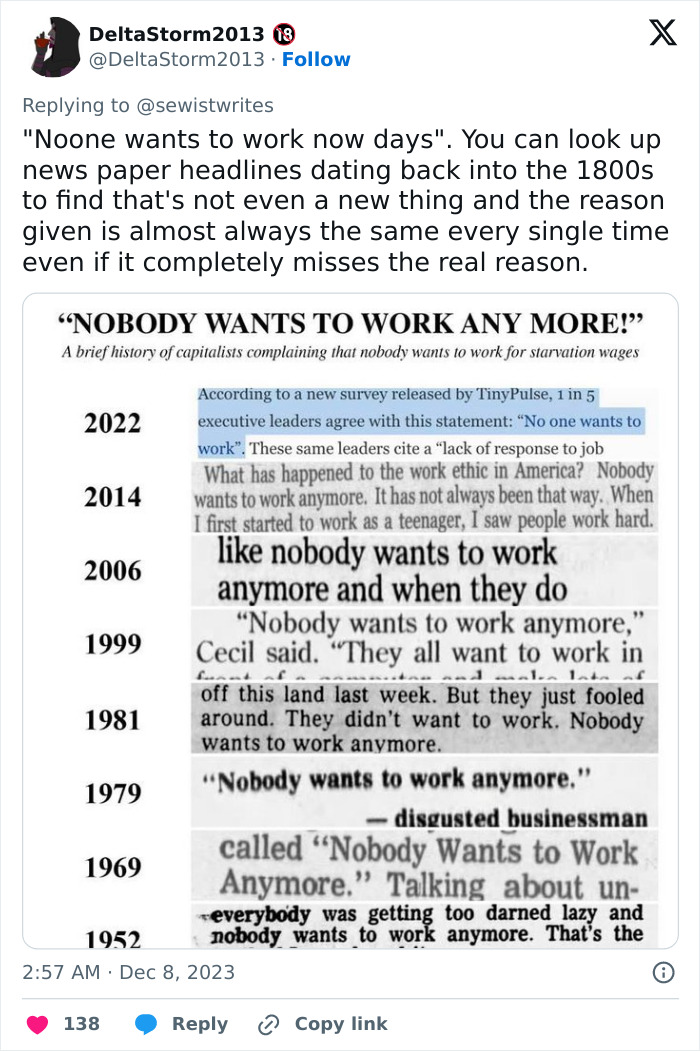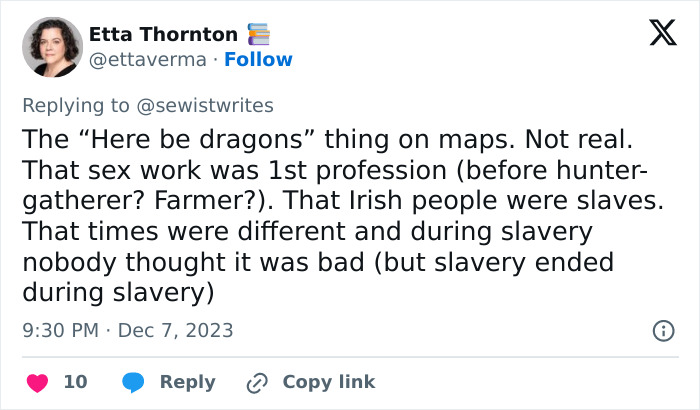Even though there is only one true way of how historical events actually unfolded, there sure are many myths and legends that surround them. And while some seem way too far-fetched, others can be quite convincing, which is why they often become rather widely known.
A netizen going by the moniker of ‘sewistwrites’ recently turned to X (formerly Twitter) to learn more about such convincing yet not necessarily accurate historical myths. She shared that the ones that make her hackles rise relate to corsets and romance, this way starting a thread, which covered everything from Columbus to salt, and beyond. Scroll down to find more historical myths shared by the netizens on X and see what other bits of historical information might not be entirely true.
In order to learn more about historical myths and how they can influence the way people view history itself, Bored Panda turned to associate professor of history at Southern Utah University, Dave Lunt, who was kind enough to answer a few of our questions. You will find his thoughts in the text below.

This post may include affiliate links.
In some countries, it was practically impossible for a woman to divorce her husband. In New Zealand in the early 60s, proof of adultery in court would do it. Domestic abuse wouldn't, because behaviour in the home regarded as a 'domestic' issue.
While for some, history is not much more than a bunch of names and dates, others could spend countless hours studying how certain events developed and how they changed the world we live in now.
“The decisions of people who came before us definitely impacted the world we live in today; just as our decisions will impact the people who come later,” associate professor of history at Southern Utah University, Dave Lunt, told Bored Panda, adding that history is more than just “the things that happened”.
“It’s more of the understanding and interpretation of what happened,” he explained. “Most of the time we can all agree on the basic facts, dates, and events. But history occurs in figuring out the bigger trends or effects of the events in the past. And the most interesting interpretations are usually complicated, nuanced, and firmly situated in ‘the gray areas’.”
There was a disease called the 'Green Sickness' that struck only young women. The cure was marriage. Yeah ... that would be rampant anaemia due to heavy periods. Marriage often meant repeat pregnancies, during which time the woman wouldn't bleed.
Oh, they know. That’s why every time someone promises to make schools teach it properly, the racists scramble to vote for the Racist Party.
Assoc. Prof. Lunt suggested that practicing the skills of investigation and interpretation can help make sense of our world as the years go by. “Oftentimes, very small things end up having momentous consequences in our lives. The first time we meet ‘that special someone’, we rarely understand how momentous that meeting is. The same is true of history. Only later can we appreciate the true value and importance of certain events.”
Its almost like that is a shape condusive to piling rocks as tall as possible
This is the cry of the bad employer, all of these are missing the "... for my company"
Dave Lunt shared that the idea of cause and effect is what fascinates him the most about history. “I think, in some ways, that history is similar to science in that historians develop theories and then test them against the evidence,” he said.
“But history isn’t science. Sometimes things happen that defy easy explanation. Some things don’t have a rational cause and effect; underdogs can win the big battle, or a freak weather event can alter plans, or an unexpected eclipse of the sun in August, 413 BCE can convince the Athenians to delay an attack on their enemies, allowing the enemies to regroup and defeat them. It is a desire to know more about these human factors in the events of the past that draws me to history.”
They were actually invented for men as it gave them better hold in stirrups.
I have three big heroes in computing - Ada Lovelace (who can be considered the first computer coder), Alan Turing (the enigma device and father of AI) and Margaret Hamilton (head of the team that wrote the Apollo 11 software which took "Men" to the moon and back on a computer less powerful than a modern fridge)
Unsurprisingly, the general public’s view of history is not exactly the same as those of the professionals in the field. A national survey in the US, conducted back in 2020, found that the majority of respondents—roughly two-thirds of them—consider it to be “an assemblage of names, dates, and events”. (While for practicing historians it’s more of a field that provides explanations for certain events in the past.)
The survey found that the vast majority of people (as many as nine out of ten of them) say that one can learn history everywhere, not just in school. Nearly three quarters believe that it’s easier to learn history when it’s presented like entertainment, which might be one of the reasons why the most popular sources of information for the general public are all in video format.
IIRC it was pink for boys, blue for girls before but that might also be a myth!
Greek building were mostly painted, but the origin of the painting style deserves a story by itself. The early stone temples were painted and shaped in a way that mimicked the older wooden temples and the older material used. The grey stone corniches and architraves were painted red to mimic the terracotta used to waterproof the timber roofs. The triglyphs were light blue because in the old days they were wood planks finished with beeswax on the cut face to prevent mold. The "guttae" decoration was green because it was a reminder for the oxidized bronze nails used in wooden framing, a detail that was maintained despite it had no other purpose than decoration. In Greek culture following the "natural order", i.e. what the ancient did, was of great value and architects kept some of these details going for centuries after they became effectively useless.
The 2020 survey found that the main sources of historical information for the general public are documentary and fictional movies and television, followed by various online and print sources, and museums, with history lessons and college courses lining up at the end of the list.
Despite being the most popular, though, movies and TV were not considered to be the most reliable sources for historical information. That might be because without certain embellishments or adjustments, some historical events would be too “dry” or too complicated to follow, which, according to Lunt, is one of the likely ways myths are born.
I wish we could have those old English letters back; thorn, wynn, ethel, eth, yogh, and ash. Some English words might actually make more sense.
“I'm sure there are many factors in play, such as the unreliability of memory, differing eyewitness accounts, and the need to simplify complicated events into easy-to-follow narratives,” Assoc. Prof. Lunt told Bored Panda, discussing how false historical information becomes accepted as historical fact.
“But the one I think about the most is similar to how I approach myths—something about the non-factual version resonated with people, and that's why it stuck. In a way, it says more about the people who adopted and maintained that belief than it does about the historical (non-)event itself.”
The clothes and shoes in Bath museum of costume are tiny. Dunno about survival bias, they were mostly owned by the better off.
The western roman empire fell around 496 (even though it was slow process, not happening suddenly on that year). 1453 is the fall of Constantinople of the byzantine empire.
Lunt expanded that the way historians approach myths is not whether they are “true” (as in factual) or not, but what they reveal about the people who told them and believed them. “So, with something like the Trojan War as told by Homer, it's clearly a myth but the values of its characters reveal the values of the ancient Greeks during the time it was composed,” he provided an example.
Also, the Catholic Church and the Inquisition put very little effort in hunting witches, because that would have meant admitting existence of witchcraft and this was against the doctrine. They very much preferred burning heretics. Witch burning was mostly a Protestant and Puritan thing. That's why it was quite common in UK and America (also Germany and Denmark for a while).
Well, there were laws about what colors various ranks of people could wear (hence the phrase 'royal blue' - or maybe more accurately, purple), so there is that. More here: https://www.encyclopedia.com/social-sciences-and-law/law/law/sumptuary-laws#:~:text=SUMPTUARY%20LAWS.,cloths%2C%20garments%2C%20or%20ornamentation.
Assoc. Prof. Lunt continued to share more examples of how myths work in the context of history. “One of the most prevalent myths about the Punic Wars between ancient Rome and ancient Carthage is that, after Rome conquered Carthage in the third war in 146 BCE, the Romans destroyed the North African city and sowed the land with salt, so that nothing would grow there. It's a powerful image that is repeated often enough, but really has no basis in the historical record.”
The expert pointed out that some authors suggest that the myth of sowing salt at Carthage possibly came from the Hebrew Bible/Old Testament, where the city of Shechem is destroyed and sown with salt.
“Perhaps that is the case; perhaps not; but it's easy to see modern narratives attempting to juxtapose the inevitable triumph of the Israelites with the inevitable triumph of Rome over their enemies,” he said, adding that “inevitable” in this case means that people in the future who write the histories know how the past turned out.
Google proper Old English and see if you can read it. It does help a lot if you know German though.
Gladiators weren't all slaves. Sure, a good number of them were prisoners and slaves sentenced to damnati, but there were Gladiator schools. People, free non-citizens and citizens, trained to become gladiators - the pay was good, there was housing, and the food was guaranteed. Thy might have even gotten fame and fortune - they kept all of their prize money and any gifts they were given, some famous gladiators even sponsored goods and bathouses.
Lunt discussed another example of a prominent—now faded—myth from ancient history, which is the belief that ancient athletics were for "amateurs".
“As modern sport developed in Britain and Europe, and as the Olympic Games were revived in their current form in the 1890s, 19th-century British sporting ideals of ‘amateurism’ were transferred onto ancient Greeks in order to justify the British class-based system of sport and education. The notion came from the fact that Greek athletes who triumphed at Olympia received only a crown of olive leaves (although they received lucrative prizes in other venues).
“This reimagination of the ancient Greeks allowed British schools and sporting groups to systematically exclude anyone who labored for money, reserving their sporting endeavors for aristocrats,” Lunt explained.
“It's more complicated than this, of course, but the gist of it is that the modern Olympics clung to its notion of amateurism for a long time—the 1990s is when most Olympic competitions became open to professional athletes; the Dream Team of NBA players in Barcelona in 1992 was a watershed moment.”
The expert added that even now, in the US, we are watching the last vestiges of amateurism wash away on college campuses as various deals allow players to make money from their athletic endeavors.
“In the end, this says more about the people of the 19th, 20th, and 21st centuries than it does about the ancient Greeks. The intensely classist system of 19th-century Britain invented an ancient practice to justify its own exclusion of lower-class athletes. This transferred to the United States on college campuses, long a bastion of upper-class privilege in the USA. It wasn't until the 1980s that David Young published The Olympic Myth of Greek Amateur Athletics that the belief in ancient amateurism was torn down,” Lunt said.
What is a bullet-proof vest if not body armor? It's just not plate metal anymore.
The samurai loved guns because they were literally mercenaries by our modern definitions... they loved anything that made their job easier...
“I think we all today are well versed in notions of ‘fake news’ or ‘revisionist history’, or whatever skeptical approach we wish to employ when trying to comprehend and understand the events of the past,” Lunt said, discussing how myths around certain historical events affect the way people view the past.
“On the super-cynical side, some people would state that the past is ‘unknowable’ and we each have our ‘own truth’ as we saw it and see it. On the super-literal side, those who need their preferred version of history to be true, no matter what the evidence indicates, are just as guilty of being unwilling to engage with other viewpoints.
“Ultimately, in my opinion, both of these approaches reveal as much, maybe even more, about the people who wrote the history, or the people today who accept or reject it, than the recorded events themselves.”
That American women were "given" the right to vote. No, they fought long and hard for 70 years.
I agree with the corsets thing. It is also a myth that the Wall Street Crash caused the Great Depression - it certainly contributed, but other factors were in play that would have resulted in a devastating recession anyway.
Yeah, saying the crash caused the Depression is like saying that tickle in your throat caused your cold. No, it's the first symptom, not the cause.
Load More Replies...That today's Democratic Party was the party of the KKK. I see this one all the time and it makes me so angry. The parties switched ideologies over time. See also: the party of Lincoln. Abraham Lincoln would be APPALLED by today's Republican party.
The stereotype of prehistoric peoples as animalistic and less than human. It’s weird how people need to believe those who came before us were stupid.
The idea that the Catholic Church was anti-science and anti- intellectual. The list of scientists & philosophers, who were also ranking members of the church is quite long.
Not exactly a "history myth", but it is historical. "Cerberus" does not mean "Spot." The theory for that etymology is contested, and so is every other theory for that matter. We just don't know what Ceberus' name means.
Yes but if it is true, that means ancient Greeks named a dog “spot” which is amazing
Load More Replies...That the Regency period in England was lavish and luxurious. Sure if you were a member of the Ton. But the Prince took food from the mouths of families, goods from the retailers and work from the poor to fund his lifestyle. The rich were fine, but a lot of others lived in filth, hunger and poverty.
I’ve never heard anyone claim that in the whole of my lifetime.
Load More Replies...That American women were "given" the right to vote. No, they fought long and hard for 70 years.
I agree with the corsets thing. It is also a myth that the Wall Street Crash caused the Great Depression - it certainly contributed, but other factors were in play that would have resulted in a devastating recession anyway.
Yeah, saying the crash caused the Depression is like saying that tickle in your throat caused your cold. No, it's the first symptom, not the cause.
Load More Replies...That today's Democratic Party was the party of the KKK. I see this one all the time and it makes me so angry. The parties switched ideologies over time. See also: the party of Lincoln. Abraham Lincoln would be APPALLED by today's Republican party.
The stereotype of prehistoric peoples as animalistic and less than human. It’s weird how people need to believe those who came before us were stupid.
The idea that the Catholic Church was anti-science and anti- intellectual. The list of scientists & philosophers, who were also ranking members of the church is quite long.
Not exactly a "history myth", but it is historical. "Cerberus" does not mean "Spot." The theory for that etymology is contested, and so is every other theory for that matter. We just don't know what Ceberus' name means.
Yes but if it is true, that means ancient Greeks named a dog “spot” which is amazing
Load More Replies...That the Regency period in England was lavish and luxurious. Sure if you were a member of the Ton. But the Prince took food from the mouths of families, goods from the retailers and work from the poor to fund his lifestyle. The rich were fine, but a lot of others lived in filth, hunger and poverty.
I’ve never heard anyone claim that in the whole of my lifetime.
Load More Replies...
 Dark Mode
Dark Mode 

 No fees, cancel anytime
No fees, cancel anytime 



































































































